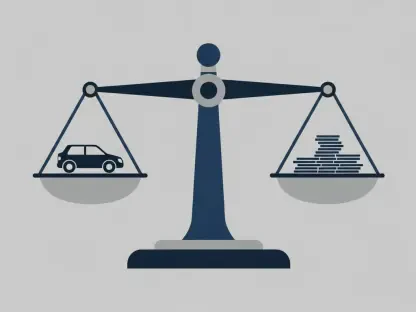In a landscape increasingly shaped by digital advancement, the insurance industry finds itself at a pivotal juncture where traditional practices are being challenged and redefined. As insurance enterprises grapple with the intricacies of modern technology, figures like Garrett Droege have emerged as key players, channeling the power of artificial intelligence (AI) and blockchain into the insurance domain and crafting mechanisms that align with the demands of the digital era. This endeavor aims not only to integrate advanced technologies but to facilitate a seamless transition from conventional to modern methodologies, ensuring that once-niche concepts become commonplace within mainstream insurance operations.
Decoding Blockchain and Digital Assets
Bridging Technology and Insurance
Blockchain, initially viewed with skepticism within conservative sectors, offers a decentralized and secure framework for transactions, promising increased transparency and reduced fraud within insurance processes. This distributed ledger technology can systematically overhaul functions ranging from claims processing to policy issuance. Garrett Droege, representing IMA Financial Group, exemplifies the necessary role of an educator and innovator. His mission is to demystify blockchain technologies for underwriters unfamiliar with its nuances. By elucidating blockchain’s capabilities and differentiating its risks from traditional technology systems, Droege is rewriting the narrative and making it accessible for insurance adoption.
The partnership between IMA, CoinDesk, and Chainproof marks a significant stride in realizing the potential of blockchain applications in insurance. Their joint development of a staking insurance product addresses the inherent risk management requirements for protocols using digital assets. This initiative required translating new and complex exposures—integral to evolving digital asset sectors—into terms the insurance sector could comprehend and manage effectively. Such translations are crucial in nurturing acceptance and integrating digital asset-based solutions into standard insurance offerings. Droege’s work bridges gaps between the tech-savvy and the traditionally grounded, facilitating a platform where both can thrive symbiotically.
Navigating Misconceptions and Educating Stakeholders
The insurance industry’s journey toward embracing modernization involves dismantling longstanding misconceptions associated with emerging technologies like blockchain. Often hindered by an unclear risk profile, these innovations require a fundamental shift in understanding and acceptance. Droege’s role frequently entails debunking myths and educating stakeholders who are critical in underwriting these technologies. By explaining the intrinsic mechanics of blockchain and the distinctive nature of its risks compared to conventional frameworks, a more informed and receptive environment is fostered within the insurance sector.
Education and transparent dialogue are critical in establishing a foundation where stakeholders feel confident in the viability of technological insurance products. Droege articulates the distinctiveness of known and unknown risks, preparing risk managers and brokers to advocate for these innovations compellingly. The interplay of education and advocacy functions as a catalyst for broader acceptance, allowing insurance professionals to acknowledge the tangible benefits of such integrations. Broader acceptance consequently boosts innovation within traditional frameworks, setting the stage for further technological introductions.
Integrating AI into Insurance Products
Addressing Challenges with Historical Data
Artificial intelligence, with its vast computational capabilities, holds significant promise for the insurance industry, particularly in risk assessment and claims automation. However, the challenge lies in the absence of substantial historical data to underpin AI-driven insurance products. Garrett Droege identifies these complexities and aims to navigate them through strategic communication. By equipping industry professionals with the necessary insights to convey the uncertainties and potential benefits effectively, Droege fosters an environment where underwriters feel prepared to engage with AI innovations.
Without historical data sets that guide traditional risk assessment, insurance companies face the challenge of stepping into uncharted territories. Through transparent discussions and well-informed projections, risks associated with AI can be conveyed convincingly. Droege prioritizes bridging this knowledge gap by offering insights into AI technologies’ potential, even without precedent. By advocating a detailed understanding of anticipated risks and manifold benefits, he encourages the industry to transcend its cautious hesitance and embrace the calculated risks presented by AI-based insurance solutions.
Building Flexibility in Insurance Offerings
Garrett Droege’s vision for the integration of AI emphasizes the necessity of flexible offerings tailored to individual use cases. This might include rethinking traditional models, favoring situational-driven coverage. Insurance policies designed to leverage AI potential—such as usage-based coverage—emerge as innovative, allowing policyholders to activate coverage only during specific risk exposures. This flexibility aligns with the principles of modern technology, offering enhanced and personalized services that resonate with the evolving expectations of clients.
The movement toward flexible, on-demand insurance solutions signifies a departure from conventional, time-bound policies. Droege’s advocacy for such flexible modalities positions the insurance industry on the path toward not only embracing AI technologies but adapting to the fluid demands of contemporary digital transformations. As unpredictable as the ever-evolving tech landscape may appear, such strategic adaptations demonstrate the preparedness of the insurance industry to respond to change, fostering a climate of innovation and adaptability.
Redefining the Insurance Landscape
Embracing Change with Strategic Trust
The essence of innovation within the insurance industry is confronting the inherent discomfort linked to change, often meeting resistance from those accustomed to time-honored systems. Garrett Droege underscores the importance of nurturing trust and leading teams that recognize the value of ingenuity. Trust is a pivotal element for navigating unfamiliar products, facilitating progress despite uncertainties. By maintaining focus on delivering better and more apt solutions, particularly with new products, Droege emphasizes a future-oriented approach that positions the industry to adapt and evolve.
Innovation requires discomfort to be a stepping stone rather than a barrier. The promise of delivering distinguishable improvements should resonate through new product introductions, directly influencing stakeholders. With a proactive mindset that prioritizes trust-building among team members and stakeholders, the shift from traditional legacy systems to innovative technologies becomes an attainable goal. Enlightened leadership, which champions transparent and informed decision-making, fosters an environment where embracing change is not just a necessity but an eagerly anticipated evolution.
Charting a Future with Usage-Based Products
In the rapidly evolving digital landscape, the insurance industry faces a crucial turning point where traditional practices are being questioned and reshaped. As firms within the insurance sector contend with the complexities that modern technology presents, individuals like Garrett Droege have emerged as influential figures. Droege is spearheading initiatives that leverage artificial intelligence (AI) and blockchain technology to transform the insurance field, developing systems that meet the expectations of today’s digital age. This initiative aims not only to incorporate cutting-edge technology but also to ensure a smooth transition from traditional methods to innovative approaches. The goal is to make once-specialized concepts part of everyday operations in the insurance industry. By doing so, Droege and others in the field are helping to usher in a new era where AI and blockchain are no longer viewed as niche technologies but as fundamental components of mainstream insurance processes, ensuring the industry remains relevant and efficient in a modern world.









